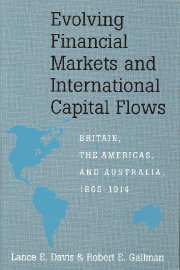 Evolving Financial Markets and International Capital Flows
Evolving Financial Markets and International Capital Flows Published online by Cambridge University Press: 18 August 2009
Introduction
As a result of the revolutionary movement in Spain's American empire, Argentina achieved independence early in the nineteenth century. By 1810 Buenos Aires was free, de facto, and by 1816, de jure; but the wars continued (with Argentine participation) until 1824, when the Spanish empire in America was largely liquidated. Conditions in Argentina continued unsettled until 1829, when the dictator Juan Manuel Rosas came to power. Traditional historiography treats the period of the Rosas regime as a time of political and social retrogression and economic stagnation:
The History of Argentina to 1860 is still commonly framed in the mythic terms imposed by Domingo Sarmiento in his novel Facundo. According to Sarmiento's enduring trope, the failure by 1820 of the first Republican experiments led inexorably to a bloody conflict between “civilization and barbarism.” Central to this dramatic representation of the region's history is the assertion of a fundamental rivalry between rural and urban cultures. Federalism and Unitarism were, therefore, ideological expressions of antithetical cultural traditions. The brutality, cruelty, and personalism of Juan Manuel de Rosas were natural and predictable given the brutishness, isolation, and pure physicality of life on the livestock frontier that spawned him.
No one denies the cruelty or political repression of the Rosas regime, nor even its opposition to the expansion of economic ties with Europe and North America; but modern interpreters do not find evidence of economic failure and stagnation during this period.
To save this book to your Kindle, first ensure [email protected] is added to your Approved Personal Document E-mail List under your Personal Document Settings on the Manage Your Content and Devices page of your Amazon account. Then enter the ‘name’ part of your Kindle email address below. Find out more about saving to your Kindle.
Note you can select to save to either the @free.kindle.com or @kindle.com variations. ‘@free.kindle.com’ emails are free but can only be saved to your device when it is connected to wi-fi. ‘@kindle.com’ emails can be delivered even when you are not connected to wi-fi, but note that service fees apply.
Find out more about the Kindle Personal Document Service.
To save content items to your account, please confirm that you agree to abide by our usage policies. If this is the first time you use this feature, you will be asked to authorise Cambridge Core to connect with your account. Find out more about saving content to Dropbox.
To save content items to your account, please confirm that you agree to abide by our usage policies. If this is the first time you use this feature, you will be asked to authorise Cambridge Core to connect with your account. Find out more about saving content to Google Drive.